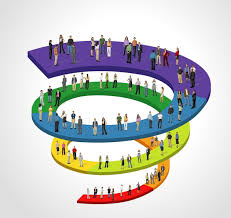The way technology has changed and shaped how we view things is not something anyone could have even imagined. I know my generation grew up with all the technological advantages, whereas my parents and grandparents are still understanding and adapting to all the new inventions. Although we are all grateful for how technology has changed our lives when it comes to television, cell phones, and computers, making it easier for us to work, learn, communicate, and gather information. But it's important to also recognize that with technological advances, there are also downsides.
As I mentioned before, our generation grew up with technology, making our digital footprint start when we were young. I know when I was 12 and got my first phone, I downloaded Instagram and posted on my Instagram page; was it anything bad? No. But those posts, pictures, comments, likes, and everything I did at that age are on the internet forever. Having a clean digital footprint isn't always the case for many teens. A teenager, Brooke, a 15-year-old from California, but at the time of this story, she was 12 when she got her first phone. Brooke became so obsessed with it that she claimed, “It was my heart.” A year later, police showed up at her home, stating she was getting blackmailed by her nude photos.
The power social media can have on teenagers is so strong that most people won't understand until they go through it. Social media is as bad as drug addiction, you stay up for hours, you follow random people, you send things to people, and you post things because, at this time, you're not thinking of your future or how these things are not just a quick post or photo. All of these things dont just impact your future, but they also impact your mental state. People will stay up for hours scrolling through social media, losing sleep. Following random people and posting random things can change your view on things and how people view you. What goes on the internet always stays on the internet.
Not only has technology changed how we communicate online, but it has also changed how we communicate in person. I can't count how many times my friend group has asked to all hang out or have a game night, and 70% of that time, everyone sits on their phone. Phones can kill friendships, you lose the emotional part of a friendship when everything they say has to do with something on their phone, you lose how to genuinely have a conversation with someone, and you lose your social skills. If I wanted to sit on my phone and say nothing, I would have just stayed in my room. “89 percent of Americans say that during their last social interaction, they took out a phone, and 82 percent said that it deteriorated the conversation they were in.” The fact that this is almost 100% is embarrassing how people choose to have a conversation. As amazing as technology has changed the way we communicate online, it's completely taking away our communication offline.
I just mentioned two negatives, so let's move into the positives of technology because it is truly amazing and keeps advancing. As a full-time student, technology is all of our saving grace. It allows us to watch lectures we could have missed, participate in group projects, complete assignments, and gives us the opportunity to learn in our own way. From a teacher's perspective, it gets papers graded faster, keeps them organized, and gives them unique ways to teach the class, keeping us engaged. “76% of students say that technology makes learning more engaging.” Since technology is now the center of life, kids can’t just listen to a teacher lecture them for 7 hours on end, they need visuals, they need engagement, and they need participation to be able to stay intent in the class. I know now in my old elementary school, all the projectors are touch screen, that little incentive makes the kids want to engage and have the opportunity to go up and write on the board. Kids learn by what they find fascinating, and that's now technology.
Not only has it helped in everyday education, but technology played a massive factor when COVID-19 struck. Not only did technology help us with school, work, and even dining. It played a crucial role in the digital health world. Throughout the pandemic, there has been a growing availability and diversity of digital health tools, including telehealth, smartphone health apps, machine learning, and artificial intelligence. Each of these technologies has contributed in unique ways to reducing the spread of COVID-19. What is even more impactful is these tools didn't just go away when the pandemic stopped, but they continue to grow and make our world a better and stronger society. A traumatic outbreak occurred in 2021, but so many powerful technological advances happened, and that's something no one would ever trade. We grew as a nation and invented things no one would have realized we needed if that pandemic didn't occur.
Overall, technology is who we are today. There is no way to escape this reality; there are only ways to control it. Being aware of the power technology has on us as a whole is so important. Using technology as a positive and not as a tool to have shortcuts or ruin people. “Technology is best when it brings people together” Matt Mullenweg.
























